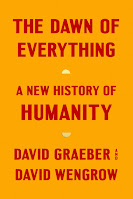What would happen if we examined the emergence of culture from a completely different point of view than most of our history books tell us? What if inequality isn't a natural human condition and, instead, is the result of the imposition of western misinterpretations designed to justify the way of life that "advanced" cultures have adopted? What if reinterpretation of the historical record started with indigenous peoples and not the elites of world culture?
These are questions woven throughout Graeber & Wengrow's The Dawn of Everything: A New History of Humanity (2021). The impact of reading this deep dive into archeological and anthropological research was mind-boggling. I appreciated the level of detail in the interior chapters, although it was sometimes overwhelming. Upon review of the sections I highlighted while reading, I found that Chapters 1, 2, and 12 beautifully captured the core purposes of the entire book, and that was to propose the possibility that history has been shaped in ways to support current political and economic systems, systems that have created inequity, abuse, and violence. Further, Graeber & Wengrow ask the reader to explore the potential that the conditions observed so widely in the contemporary world were not inevitable and that change, even now, is possible.Chapter 1 began with reflection on the impact of Hobbe's Leviathan, "in many ways the founding text of modern political theory" and its assertion of "humans being the selfish creatures they are... 'solitary, poor, nasty, brutish and short'" (p. 2). This original state (reinforced by Torah and Old Testament Bible stories of original sin, and accompanying isolation, competition, deprivation, and war) was envisioned as being correctable through the "Enlightenment" advocated among European philosophers and intellectuals of the 18th century. What's fascinating is that Enlightenment thought related to individual liberty and political equality actually came from early European exposure to Native Americans and their communities, which were unusual in "qualities of mutual care, love and above all happiness" (p. 20). While some of the early voyagers to "Turtle Island" characterized Native Americans as "noble savages," others saw that they were freer societies than those of Europe.
Enlightenment thinkers were especially impressed with the discourse, debate, and reason of Kandiaronk of the Wendat tribe during his visit to France. Kandiaronk declared as a result of his visit, "What kind of human, what species of creature, must Europeans be, that they have to be forced to do good, and only refrain from evil because of fear of punishment?" (p. 53). Kandiaronk also observed that forcing people to behave would be unnecessary but for the presence of "money, property rights and the resultant pursuit of material self-interest" (p. 54). The French saloniste of the 1750s recognized the conflict between commitments to freedom and equality versus the regime of private property ownership, which brought Rousseau to question how Europeans had turned wealth into domination and power, allowing the winners to tell others what to do, to exploit them, and care so little about their human condition.
Countering the prevailing theorizing about the formation of states, The Dawn of Everything proposed that small communities either existed on their own or broke away from organized despotic abusers and abuses in numerous examples. Now proven untrue, previous cultural anthropologists viewed state formation as an inevitable linear evolution from bands to tribes to chiefdoms to states based on advances in technology such as agriculture. Instead of a linear progression, organized communities emerged through a process of what 1930s anthropologist Gregory Bates coined as "schismogenesis," where self-governing communities formed to differentiate themselves from the abuses of classism, monarchy, and militarism. The new understanding of what constituted organized community was most evident in the North American example of the urban center Cahokia, which already existed when Europeans arrived in North America. Cahokia included three elementary freedoms - "to move away, to disobey, and to build new social worlds" (p. 469). This and other Native American examples demonstrated that is is possible to avoid the evolutionists' view of organized states and this view was embraced by Enlightenment thinkers.
The analysis included in The Dawn of Everything showed that the rise of "states" such as Egypt and the Maya depended on confusing the two functions of care and domination. This confusion was central to how humans eventually lost their ability to see another way of living in community as even possible. As the cultures that we commonly view as most significant began forming, charismatic figures created expanded systems of care around themselves (sometimes focusing on preparation for a presumed afterlife), which grew into the ability to dominate through threat of life or livelihood which was enforced either through a systematized administration or military mobilization. These tools of despotic states are not present in examples such as Minoan Crete, where women's influence was much more prominent and equality more common. Relegating these examples to the margins of history, rather than recognizing them as legitimate human aspiration, extinguished them as demonstrations of communities embracing greater equity, caring for each other, and preserving the natural world.
Graeber & Wengrow proposed that by continuing to reduce humanity to simple, barbarian-like depictions, social scientists might actually have impoverished history - "and as a consequence, to impoverish our sense of possibility" (p. 21) in the modern day. The evidence was right under our noses, but maybe that's the point. How Native Americans lived was a threat to notions of property ownership, accumulation of wealth, and domination through control of information and threat of life.

No comments:
Post a Comment